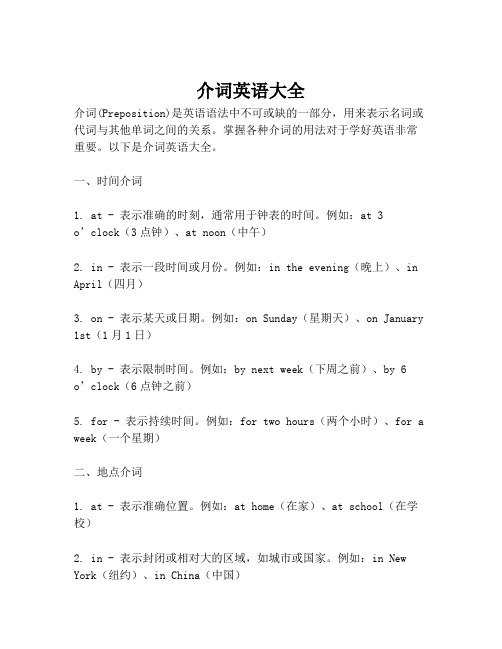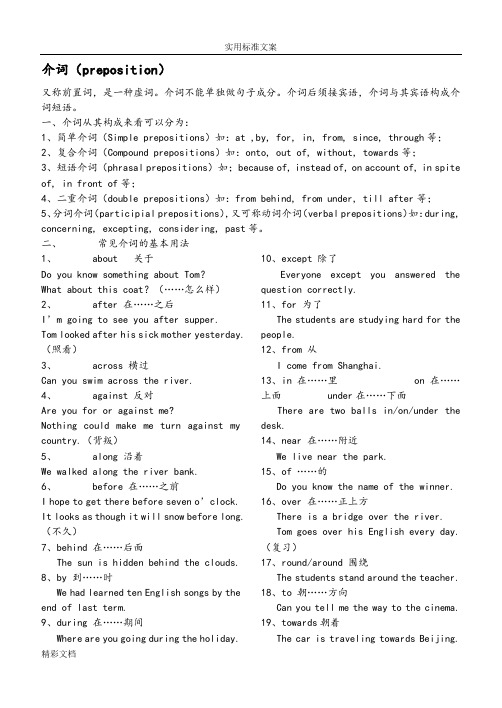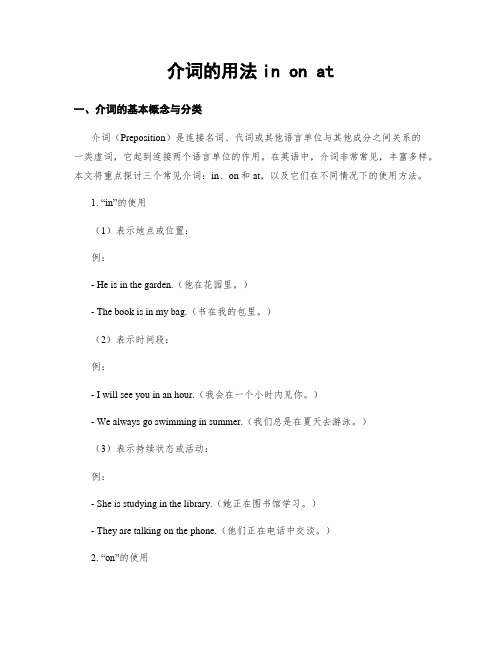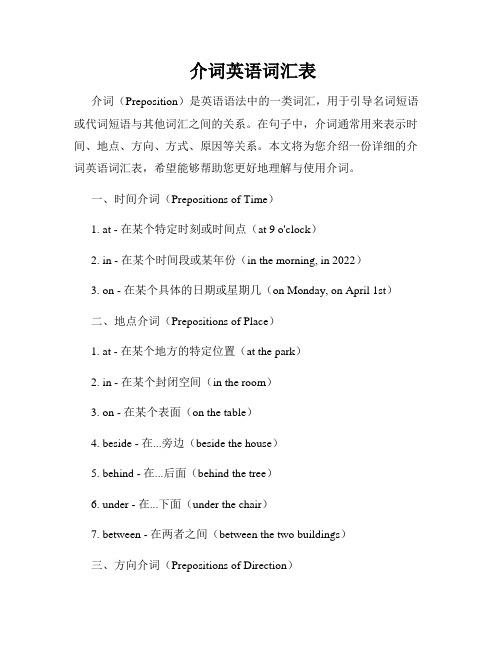英语中常见介词及用法Preposition
英语介词用法大全

英语介词用法大全 TTA standardization office【TTA 5AB- TTAK 08- TTA 2C】介词(The Preposition)又叫做前置词,通常置于名词之前。
它是一种虚词,不需要重读,在句中不单独作任何句子成分,只表示其后的名词或相当于名词的词语与其他句子成分的关系。
中国学生在使用英语进行书面或口头表达时,往往会出现遗漏介词或误用介词的错误,因此各类考试语法的结构部分均有这方面的测试内容。
1. 介词的种类英语中最常用的介词,按照不同的分类标准可分为以下几类:(1). 简单介词、复合介词和短语介词①.简单介词是指单一介词。
如:at , in ,of ,by , about , for, from , except , since, near, with 等。
②. 复合介词是指由两个简单介词组成的介词。
如:Inside, outside , onto, into , throughout, without , as to as for , unpon, except for 等。
③. 短语介词是指由短语构成的介词。
如:In front of , by means o f, on behalf of, in spite of , by way of , in favor of , in regard to 等。
(2). 按词义分类{1} 表地点(包括动向)的介词。
如:About ,above, across, after, along , among, around , at, before, behind, below, beneath, beside, between , beyond ,by, down, from, in, into , near, off, on, over, through, throught, to, towards,, under, up, unpon, with, within , without 等。
介词英语大全

介词英语大全介词(Preposition)是英语语法中不可或缺的一部分,用来表示名词或代词与其他单词之间的关系。
掌握各种介词的用法对于学好英语非常重要。
以下是介词英语大全。
一、时间介词1. at - 表示准确的时刻,通常用于钟表的时间。
例如:at 3o’clock(3点钟)、at noon(中午)2. in - 表示一段时间或月份。
例如:in the evening(晚上)、in April(四月)3. on - 表示某天或日期。
例如:on Sunday(星期天)、on January 1st(1月1日)4. by - 表示限制时间。
例如:by next week(下周之前)、by 6 o’clock(6点钟之前)5. for - 表示持续时间。
例如:for two hours(两个小时)、for a week(一个星期)二、地点介词1. at - 表示准确位置。
例如:at home(在家)、at school(在学校)2. in - 表示封闭或相对大的区域,如城市或国家。
例如:in New York(纽约)、in China(中国)3. on - 表示在物体上面。
例如:on the table(在桌子上)、on the wall(在墙上)4. under - 表示在物体下面。
例如:under the bed(床底下)、under the tree(树下)5. over - 表示在物体上方。
例如:over the bridge(桥上)、over the sky(天上)6. behind - 表示在物体后面。
例如:behind the door(门后)、behind the curtain(帘后)7. in front of - 表示在物体前面。
例如:in front of the house (房子前面)、in front of the mirror(镜子前面)8. at the back of - 表示在物体后面。
语法归纳介词的分类与用法

语法归纳介词的分类与用法介词是英语语法中的一类虚词,用于连接名词、代词、动词或其他词组,起到指示、限定或补充的作用。
在日常交流中,正确使用介词可以使句子更加准确、通顺,并且更好地表达自己的意思。
本文将对常见的介词分类和用法进行归纳总结。
一、位置介词(Prepositions of Place)1. On(在……上面):- 表示某物处于平面上,例如:on the table(在桌子上)- 表示某物在某个交通工具上,例如:on the bus(在公交车上)2. In(在……里面):- 表示某物处于空间之中,例如:in the room(在房间里)- 表示某物位于某地,例如:in Beijing(在北京)3. At(在……处):- 表示某物在某个具体位置,例如:at the park(在公园里)- 表示某个时间点,例如:at 9 o'clock(在九点)4. Under(在……下面):- 表示某物处于其他物体下方,例如:under the bed(在床底下)- 表示某物位于某个地理位置下方,例如:under the bridge(在桥下)二、方向介词(Prepositions of Direction)1. To(到……):- 表示向某个地点移动,例如:go to the cinema(去电影院)- 表示给予某人或某物,例如:give the book to Tom(把书给了汤姆)2. From(从……来):- 表示从某个地点出发,例如:come from Beijing(从北京来) - 表示某物来源于某处,例如:a gift from my friend(来自我朋友的礼物)3. Into(进入……内):- 表示进入或穿过某个空间,例如:jump into the pool(跳进游泳池)- 表示某物转化为另一种状态,例如:transform into a butterfly (变成蝴蝶)4. Out of(离开……):- 表示离开某个地点,例如:get out of the car(从车里出来)- 表示摆脱某种状态或限制,例如:break out of prison(越狱)三、时间介词(Prepositions of Time)1. In(在……时):- 表示某个具体时间段,例如:in the morning(在早上)- 表示某个季节或年份,例如:in summer(在夏季)2. On(在……日):- 表示具体的某一天,例如:on Monday(在星期一)- 表示节日或特殊的日期,例如:on Christmas Day(在圣诞节)3. At(在……点):- 表示具体的某个时间点,例如:at 2 p.m.(在下午两点)- 表示某个时刻,例如:at midnight(在午夜)4. For(持续时间):- 表示持续的一段时间,例如:study for two hours(学习两个小时) - 表示某事发生的时间跨度,例如:for the whole week(整个星期)四、原因介词(Prepositions of Reason)1. Because of(因为):- 表示某个原因导致某个结果,例如:He couldn't come because of the bad weather(因为天气不好,他不能来)2. Due to(由于):- 表示某个原因导致某个结果,具有正式文体,例如:The train was delayed due to heavy rain(由于大雨,火车晚点了)3. Owing to(由于):- 与 due to 同义,用法上稍显书面,例如:The match was canceled owing to the lack of players(由于队员不足,比赛被取消)五、方式介词(Prepositions of Manner)1. By(通过、以……方式):- 表示某种方法或手段,例如:travel by plane(乘飞机旅行)- 表示某种交通方式,例如:go to work by bus(乘公交车上班)2. With(用……方式):- 表示伴随或使用某种物品,例如:write with a pen(用钢笔写)六、比较介词(Prepositions of Comparison)1. Like(像):- 表示类似、相似,例如:She looks like her mother(她长得像她妈妈)- 表示比较相近的程度,例如:It tastes like chicken(尝起来像鸡肉)2. Unlike(与……不同):- 较 like 相反,表示与某事物不同,例如:He is unlike his brother in personality(他的性格与他弟弟不同)以上是常见的介词分类和用法总结。
(完整word版)介词用法归纳,推荐文档

介词(preposition)又称前置词,是一种虚词。
介词不能单独做句子成分。
介词后须接宾语,介词与其宾语构成介词短语。
一、介词从其构成来看可以分为:1、简单介词(Simple prepositions)如:at ,by, for, in, from, since, through等;2、复合介词(Compound prepositions)如:onto, out of, without, towards等;3、短语介词(phrasal prepositions)如;because of, instead of, on account of, in spite of, in front of等;4、二重介词(double prepositions)如:from behind, from under, till after等;5、分词介词(participial prepositions),又可称动词介词(verbal prepositions)如:during, concerning, excepting, considering, past等。
二、常见介词的基本用法1、 about 关于Do you know something about Tom?What about this coat?(……怎么样)2、 after 在……之后I’m going to see you after supper. Tom looked after his sick mother yesterday.(照看)3、 across 横过Can you swim across the river.4、 against 反对Are you for or against me?Nothing could make me turn against my country.(背叛)5、 along 沿着We walked along the river bank.6、 before 在……之前I hope to get there before seven o’clock. It looks as though it will snow before long.(不久)7、behind 在……后面The sun is hidden behind the clouds.8、by 到……时We had learned ten English songs by the end of last term.9、during 在……期间Where are you going during the holiday. 10、except 除了Everyone except you answered the question correctly.11、for 为了The students are studying hard for the people.12、from 从I come from Shanghai.13、in 在……里 on 在……上面 under在……下面There are two balls in/on/under the desk.14、near 在……附近We live near the park.15、of ……的Do you know the name of the winner.16、over 在……正上方There is a bridge over the river.Tom goes over his English every day.(复习)17、round/around 围绕The students stand around the teacher.18、to 朝……方向Can you tell me the way to the cinema.19、towards朝着The car is traveling towards Beijing.20、with 和……一起me?Would you like to go to the cinema with学习这些介词时可以先记住它的汉语意思,然后参照例句来加深理解,并在今后的学习中加以灵活运用。
英语中介词的分类和用法

英语中介词的分类和用法在英语中,介词是一类很重要的词性,用于连接名词、代词或者名词性短语与其他词或短语。
介词的分类和用法如下:1. 时间介词(Time prepositions):表示时间关系的介词,包括at(在某一具体时间点)、in(在某一时间段)、on(在某一日期)、during(在某一时段内)、before(在...之前)、after(在...之后)等。
例如:- I will meet you at 9 o'clock.- My birthday is in July.- The meeting is on Monday.- We had lunch during the break.- They arrived before the party started.- She went shopping after work.2. 地点介词(Place prepositions):表示地点或位置关系的介词,包括in(在...里面)、on(在...上面)、at(在...旁边)、by(在...旁边)、under(在...下面)、over(在...上方)等。
例如:- The book is in the bag.- The cup is on the table.- There is a tree at the front of the house.- The supermarket is by the school.- The dog is under the table.- The birds are flying over the lake.3. 方式介词(Manner prepositions):表示行为方式的介词,如with(用...)、by(靠...方式)、like(像...一样)等。
例如:- He eats soup with a spoon.- She goes to work by bus.- The boy runs like a cheetah.4. 原因介词(Cause prepositions):表示原因关系的介词,如because of(因为...)、due to(由于...)、for(为了...)等。
英语中常见介词及用法Preposition

介词:用来表示物体间的关系1.表示时间的介词a.在…时候at, 表示时间点,at noon, at 12:00in, 常用在年,月或者一段时, in October, in 2016, in the morningon, 常用在某天或特定的上午,下午,晚上on Sunday, on the morning of December the third, on the morning of January 1st, on time, 准时,固定搭配before,在…之前,Before Christmasafter,在…之后,After the First World Warb.表示将来的一段时间in+时间段after+时间点My father will be back in three days.My father will be back after three o’clock.My father will be back after three days later.c.表示持续的一段时间,常与完成时连用since+时间点,自从,Tom has been doing his homework since seven o’clock.for+时间段,I have lived in Dalian for three years.d.在…期间during, 整个时间段多次发生,He often falls asleep during the class.through, 从头到, We are playing in New Zealand through November.over, 等于during. She will stay in Paris during Christmas.一边,一边, We had a pleasant chat over a cup of tea.by,到…为止,by the beginning of the centuryAll of you are to arrive at school by seven o’clock.until, till,直到…时候,until last week,I shall wait until ten o’clock.I didn’t go to sleep until midnight.2.表示地点的介词in,在…里,in the box,on,在…上面,on the desk, on the wall有时,in也可以表示在…上,但是表示物体以外的东西在上面on表示物体本身生出的东西There are lots of apples on the tree.The birds are singing in the tree.over, 在…上面,She looked herself in the mirror over the table.under, 在…下面,The little mouse is under the table.正上,正下,斜上,斜下above, 在…上面,He lifted his hands above his head.below, 在…下面,The path runs below a long brick wall.across,从物体表面穿过,through,从物体中间穿过,He walked across the fields.He walked through the forest.in, on, to, off可以表示两地方位,比较Liaoning province lies in the northeast of China.Liaoning province is to the south of Heilongjiang Province.Russia is on the north of China. 接壤Mary lives in a flat just off Bridge Avenue. 两地隔着一小段距离among, 在…中间, 三者以上between,在…中间,两者之间They hid themselves among the trees.There was a flight between the two boys.3.表示方式、手段的介词by,通过…, She earns her living by selling insuranceby sea, by water, by air, by land,by ship, by boat, by plane, by trainon, on this plane, on foot, on a horse, go to school by bikewith, useWe see with our eyes, hear with our ears, and walk with our legs in, express, 语言,笔,大小写字母Please answer me in English.Please write in capital letters.The artist wrote in ink.固定搭配on/over the telephonein this wayby this meanswith this method4.表示原因的介词with, feeling,Her face went red with anger.for, reasonThe West Lake is famous for its scenery.from, 由于,die from hunger, 饿死,tremble from fear由于害怕而发抖by,由于,by mistake由于失误by good luck由于运气好5.表示支持或反对的介词for, agree withagainst, not agree with6.表示目的的介词for 为了…, I am going to apply for a job.Are you for or against the new road scheme?That’s against the law.7.表示数量的介词其他常考介词except, except for, not includebesides, in addition toWe all passed the exam except Tom.He has always been busy except when it is Sunday.Your coat is good except for its color.We have lots of things in common besides music.besides, 还可以做副词I don’t want to go, besides, I am too tired.but=exceptNo other students passed the difficult maths exam but Mary.一些常用介词的不同用法1.with用法a.togetherWould you like to go to the theatre with us?b.表示伴随Temperatures vary with the time of the year.c.表示原因The small child trembled with fear.。
介词的用法in on at

介词的用法in on at一、介词的基本概念与分类介词(Preposition)是连接名词、代词或其他语言单位与其他成分之间关系的一类虚词,它起到连接两个语言单位的作用。
在英语中,介词非常常见,丰富多样。
本文将重点探讨三个常见介词:in、on和at,以及它们在不同情况下的使用方法。
1. “in”的使用(1)表示地点或位置:例:- He is in the garden.(他在花园里。
)- The book is in my bag.(书在我的包里。
)(2)表示时间段:例:- I will see you in an hour.(我会在一个小时内见你。
)- We always go swimming in summer.(我们总是在夏天去游泳。
)(3)表示持续状态或活动:例:- She is studying in the library.(她正在图书馆学习。
)- They are talking on the phone.(他们正在电话中交谈。
)2. “on”的使用(1)表示表面或位置:例:- The cup is on the table.(杯子放在桌子上。
)- She sat on the chair. (她坐在椅子上。
)(2)表示日期或特定日子:例:- We have a party on Saturday night. (我们星期六晚上要参加一个聚会。
)- Christmas falls on December 25th.(圣诞节在12月25日。
)(3)表示接触或联系:例:- Please write your name on the paper. (请把你的名字写在这张纸上。
)- I will call you on the phone. (我会打电话给你。
)3. “at”的使用(1)表示具体时间点或某个事件:例:- The meeting starts at 9 o'clock.(会议九点钟开始。
介词英语词汇表

介词英语词汇表介词(Preposition)是英语语法中的一类词汇,用于引导名词短语或代词短语与其他词汇之间的关系。
在句子中,介词通常用来表示时间、地点、方向、方式、原因等关系。
本文将为您介绍一份详细的介词英语词汇表,希望能够帮助您更好地理解与使用介词。
一、时间介词(Prepositions of Time)1. at - 在某个特定时刻或时间点(at 9 o'clock)2. in - 在某个时间段或某年份(in the morning, in 2022)3. on - 在某个具体的日期或星期几(on Monday, on April 1st)二、地点介词(Prepositions of Place)1. at - 在某个地方的特定位置(at the park)2. in - 在某个封闭空间(in the room)3. on - 在某个表面(on the table)4. beside - 在...旁边(beside the house)5. behind - 在...后面(behind the tree)6. under - 在...下面(under the chair)7. between - 在两者之间(between the two buildings)三、方向介词(Prepositions of Direction)1. to - 表示行动朝某个地点(go to the library)2. from - 表示离开某个地点(come from school)3. into - 表示进入某个地点(go into the room)4. out of - 表示离开某个地点(get out of the car)四、方式介词(Prepositions of Manner)1. by - 表示通过某种方式实现(travel by train)2. with - 表示通过某种手段或伴随(write with a pen, go with friends)五、原因介词(Prepositions of Reason)1. because of - 因为某个原因(because of the rain)2. due to - 由于某个原因(due to the traffic)六、其他常用介词(Other Commonly Used Prepositions)1. for - 表示目的或理由(study for the exam)2. with - 表示拥有或陪伴(with a dog, with my family)3. without - 表示没有某物或某人(without money, without you)4. about - 关于(talk about the movie)5. of - 属于或关于(friend of mine, book of the year)以上仅为部分介词的使用情况,希望通过这份介词英语词汇表,您能够更好地理解介词的用法与含义,并在英语写作或口语中更准确地运用介词。
- 1、下载文档前请自行甄别文档内容的完整性,平台不提供额外的编辑、内容补充、找答案等附加服务。
- 2、"仅部分预览"的文档,不可在线预览部分如存在完整性等问题,可反馈申请退款(可完整预览的文档不适用该条件!)。
- 3、如文档侵犯您的权益,请联系客服反馈,我们会尽快为您处理(人工客服工作时间:9:00-18:30)。
介词:用来表示物体间的关系
1.表示时间的介词
a.在…时候
at, 表示时间点,at noon, at 12:00
in, 常用在年,月或者一段时, in October, in 2016, in the morning
on, 常用在某天或特定的上午,下午,晚上
on Sunday, on the morning of December the third, on the morning of January 1st, on time, 准时,固定搭配
before,在…之前,Before Christmas
after,在…之后,After the First World War
b.表示将来的一段时间
in+时间段
after+时间点
My father will be back in three days.
My father will be back after three o’clock.
My father will be back after three days later.
c.表示持续的一段时间,常与完成时连用
since+时间点,自从,Tom has been doing his homework since seven o’clock.
for+时间段,I have lived in Dalian for three years.
d.在…期间
during, 整个时间段多次发生,He often falls asleep during the class.
through, 从头到, We are playing in New Zealand through November.
over, 等于during. She will stay in Paris during Christmas.
一边,一边, We had a pleasant chat over a cup of tea.
by,到…为止,by the beginning of the century
All of you are to arrive at school by seven o’clock.
until, till,直到…时候,until last week,
I shall wait until ten o’clock.
I didn’t go to sleep until midnight.
2.表示地点的介词
in,在…里,in the box,
on,在…上面,on the desk, on the wall
有时,in也可以表示在…上,但是表示物体以外的东西在上面
on表示物体本身生出的东西
There are lots of apples on the tree.
The birds are singing in the tree.
over, 在…上面,She looked herself in the mirror over the table.
under, 在…下面,The little mouse is under the table.
正上,正下,斜上,斜下
above, 在…上面,He lifted his hands above his head.
below, 在…下面,The path runs below a long brick wall.
across,从物体表面穿过,
through,从物体中间穿过,
He walked across the fields.
He walked through the forest.
in, on, to, off可以表示两地方位,比较
Liaoning province lies in the northeast of China.
Liaoning province is to the south of Heilongjiang Province.
Russia is on the north of China. 接壤
Mary lives in a flat just off Bridge Avenue. 两地隔着一小段距离among, 在…中间, 三者以上
between,在…中间,两者之间
They hid themselves among the trees.
There was a flight between the two boys.
3.表示方式、手段的介词
by,通过…, She earns her living by selling insurance
by sea, by water, by air, by land,
by ship, by boat, by plane, by train
on, on this plane, on foot, on a horse, go to school by bike
with, use
We see with our eyes, hear with our ears, and walk with our legs in, express, 语言,笔,大小写字母
Please answer me in English.
Please write in capital letters.
The artist wrote in ink.
固定搭配
on/over the telephone
in this way
by this means
with this method
4.表示原因的介词
with, feeling,
Her face went red with anger.
for, reason
The West Lake is famous for its scenery.
from, 由于,die from hunger, 饿死,tremble from fear由于害怕而发抖by,由于,by mistake由于失误by good luck由于运气好
5.表示支持或反对的介词
for, agree with
against, not agree with
6.表示目的的介词
for 为了…, I am going to apply for a job.
Are you for or against the new road scheme?
That’s against the law.
7.表示数量的介词
其他常考介词
except, except for, not include
besides, in addition to
We all passed the exam except Tom.
He has always been busy except when it is Sunday.
Your coat is good except for its color.
We have lots of things in common besides music.
besides, 还可以做副词
I don’t want to go, besides, I am too tired.
but=except
No other students passed the difficult maths exam but Mary.
一些常用介词的不同用法
1.with用法
a.together
Would you like to go to the theatre with us?
b.表示伴随
Temperatures vary with the time of the year.
c.表示原因
The small child trembled with fear.。
